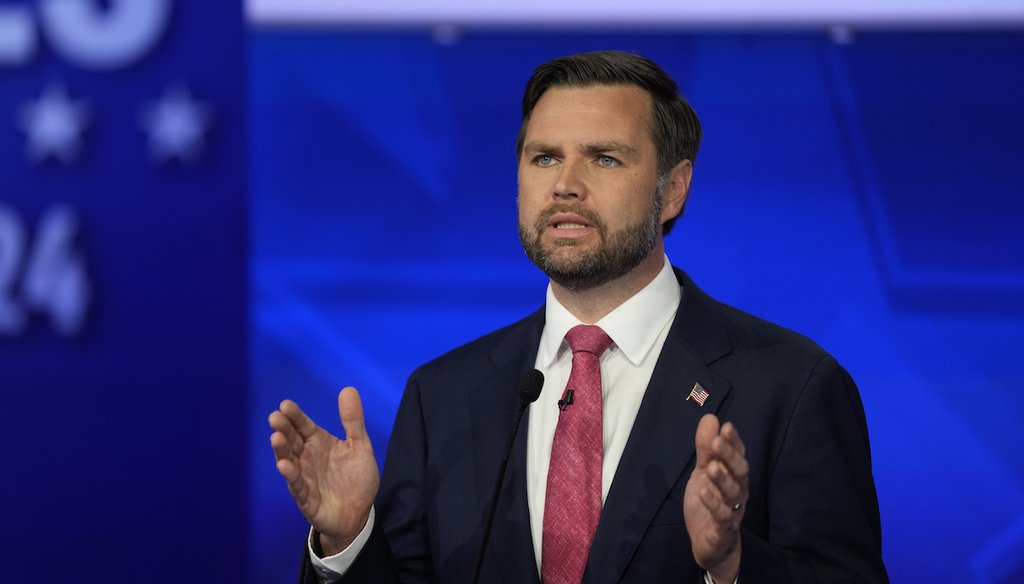Stand up for the facts!
Our only agenda is to publish the truth so you can be an informed participant in democracy.
We need your help.
I would like to contribute

Republican vice presidential nominee Sen. JD Vance, R-Ohio, speaks during a vice presidential debate hosted by CBS News, with Democratic vice presidential candidate Minnesota Gov. Tim Walz, Tuesday, Oct. 1, 2024, in New York. (AP Photo/Matt Rourke)
During the Oct. 1 vice presidential debate in New York, Sen. JD Vance, R-Ohio, declined to answer when asked whether he and former President Donald Trump would challenge the results of November’s election if they lost, as Trump had in 2020.
Instead, Vance pivoted to what he said was a much bigger threat to democracy: internet censorship.
"I believe that we actually do have a threat to democracy in this country. … It is the threat of censorship," Vance said.
Vance said Vice President Kamala Harris would "like to censor people who engage in misinformation." He said Harris "is engaged in censorship at an industrial scale. She did it during COVID. She’s done it over a number of other issues."
Then, during a back-and-forth exchange with Democratic vice presidential nominee and Minnesota Gov. Tim Walz, Vance said Harris "wants to use the power of government and big tech to silence people from speaking their minds. That is a threat to democracy that will long outlive this present political moment."
Sign up for PolitiFact texts
Many PolitiFact readers asked what Vance was talking about when referring to Harris and censorship.
Vance sought to tie Harris to President Joe Biden’s administration efforts to push social media platforms to remove what it deemed to be false content about COVID-19 during the pandemic.
The White House declined to comment.
Republicans have long bemoaned social media platforms’ efforts to moderate content, particularly during the COVID-19 pandemic. The "censorship" commentary intensified in August when Meta CEO Mark Zuckerberg told Congress that the Biden administration has pressured the company to censor some posts. But experts have told PolitiFact such pressure doesn’t amount to censorship, and the Supreme Court ruled in Biden’s favor in a lawsuit on the topic. The Trump administration similarly asked Twitter to remove some posts.
Vance’s examples
When contacted for comment, an Republican National Committee spokesperson pointed PolitiFact to several news stories:
-
A PBS News story about Zuckerberg’s August letter to the House Judiciary Committee. Zuckerberg wrote that Biden’s administration in early 2021 "repeatedly pressured" Meta to censor certain COVID-19 content, including humor and satire.
The letter did not mention Harris or any one person.
The Republican-led committee shared Zuckerberg’s letter on X, calling it a "Big win for free speech." Zuckerberg in his letter said ultimately it was the company’s decision whether to remove content, but that "the government pressure was wrong" and he regretted not speaking up about it at the time. One of Meta’s decisions Zuckerberg cited — to temporarily demote a 2020 New York Post story about Hunter Biden’s laptop after an FBI warning about a potential Russian disinformation operation — happened whileTrump was still in office.
-
An article about former White House Digital Strategy Director Rob Flaherty, now Harris’ deputy campaign manager, emailing a Facebook employee about a COVID-19 vaccine-related social media post by former Fox News host Tucker Carlson. We found no evidence that Harris had personally contacted Facebook about any posts.
-
A Washington Times article about a March 2021 White House meeting with Amazon officials about the visibility on the online retailer’s website of some COVID-19-related books.
Meta’s fact-checking program during the pandemic spanned the Trump and Biden presidencies.
PolitiFact partners with Meta on its fact-checking program to slow misinformation’s spread. As part of the partnership, Meta flags posts that the company believes may be inaccurate or misleading and fact-checkers provide feedback with published articles. Meta, which owns Facebook, Instagram and Threads, decides what, if any, action to take on its platforms.
The RNC didn’t specify what "other issues," besides COVID-19, Vance referred to at the debate.
What has Harris said?
Harris has talked about social media platforms’ responsibilities. She said in a May 2019 speech that she would hold them "accountable" for hateful content shared on platforms.
She called for Twitter to suspend Trump’s account in October 2019 for his posts discussing a whistleblower’s complaint about Trump’s phone call with Ukraine’s president that led to Trump’s first impeachment. This year, X owner Elon Musk and Robert F. Kennedy Jr., a Trump supporter and former independent presidential candidate, seized on Harris’ 2019 comments to amplify a false claim that Harris plans to shut down X if she’s elected.
An 880-page report in May from the House Judiciary Committee and its Select Subcommittee on the Weaponization of the Federal Government detailed what it called "The Censorship-Industrial Complex," referring to what it described as the Biden-Harris administration’s pressure campaign against social media companies.
The report makes no accusations specific to Harris, beyond a footnote referring to a September 2019 CNN interview in which she said Twitter should suspend Trump’s account.
Is pressuring social platforms censorship? Experts weigh in
Experts told PolitiFact in April that the Biden administration’s efforts to contact platforms about social media posts weren’t censorship unless it crossed the line into coercion, but that the Supreme Court would ultimately decide.
Sheri Berman, a Barnard College at Columbia University political science professor, said it’s reasonable for citizens and candidates to debate how much social media moderation should happen. But she said attempts to limit the spread of dangerous or false information pertaining to elections results or vaccines’ efficacy during a pandemic "is not a threat to democracy."
The Supreme Court in June rejected an effort by Republican-led states Missouri and Louisiana to restrict federal employees from pressuring social media companies to remove posts, saying the plaintiffs had no legal standing.
In the court’s 6-3 ruling, Justice Amy Coney Barrett, a Trump appointee, wrote that although the government factored in some of the platforms’ moderation decisions, "The evidence indicates that the platforms had independent incentives to moderate content and often exercised their own judgment."
Trump also pressured social media platforms
Vance’s comments also ignore evidence that the Trump administration also talked to social media platforms about removing content.
At a February 2023 House Oversight Committee hearing with then-Twitter executives about the Hunter Biden laptop story, one witness testified that the Trump White House had sought to remove a post from model Chrissy Teigen that criticized Trump.
Teigen had responded to Trump’s Sept. 8, 2019, social media post that called her "filthy-mouthed" by calling the former president a derogatory term.
Rep. Gerry Connolly, D-Va., asked Anika Collier Navaroli, formerly of Twitter’s U.S. safety policy team: "The White House almost immediately thereafter contacted Twitter to demand the tweet be taken down. Is that accurate?"
Navaroli said: "I do remember hearing we'd received a request from the White House to make sure we evaluated this tweet, and they wanted it to come down because it was a derogatory statement directed at the president."
Our Sources
Email exchange, Republican National Committee spokesperson, Oct. 2, 2024
CBS News, Read the full VP debate transcript from the Walz-Vance showdown, Oct. 2, 2024
Mark Zuckerberg’s letter, House Judiciary Committee, X post, Aug. 26, 2024
PBS NewsHour, Zuckerberg says the White House pressured Facebook to ‘censor’ some COVID-19 content during the pandemic, Aug. 27, 2024
NBC 15 News, Top Harris campaign aide involved in Biden admin's push to censor COVID posts, email shows, Aug. 29, 2024
The Washington Times, Biden aides pressed Amazon on ‘vaccine misinformation,’ reducing ‘visibility’ of COVID-related books, Feb. 5, 2024
PolitiFact, In RFK Jr.’s campaign against censorship, he made a False attack on Biden, April 5, 2024
PolitiFact, No, Kamala Harris did not say she will shut down X if elected, Sept. 5, 2024
MSNBC, Watch The ReidOut Highlights, Dec. 29, 2022
The Washington Post, Supreme Court allows White House contacts with social media firms, June 26, 2024
U.S. Supreme Court, Murthy v. Missouri, June 26, 2024
West Virginia University, The First Amendment, accessed Oct. 2, 2024
University of North Carolina School of Law, First Amendment Limits on State Laws Targeting Election Misinformation, Sept. 2, 2022
Georgetown Law, Fact Sheet: Regulation of False, Misleading, or Intimidating Speech About Elections, accessed Oct. 2, 2024
Tech Policy Press, Transcript: House Oversight Hearing with Former Twitter Executives, Feb. 9, 2023
NBC News, Chrissy Teigen's Trump diss takes center stage at House hearing meant to discuss Hunter Biden, Feb. 8, 2023
The Hill, Harris says her administration would hold social media platforms ‘accountable’ for ‘hate’, May 5, 2019
Politico, ‘A surreal experience’: Former Biden ‘disinfo’ chief details harassment, March 8, 2023
Nina Jankowicz, X post, Oct. 1, 2024
CNN, CNN post-debate analysis: Ohio, Oct. 15, 2019
CNN, Kamala Harris says Trump’s Twitter account should be suspended, Sept. 30, 2019
House Judiciary Committee and its Select Subcommittee on the Weaponization of the Federal Government, The Censorship-Industrial Complex: How Top Biden White House Officials Coerced Big Tech to Censor Americans, True Information, and Critics of the Biden Administration, May 1, 2024
































